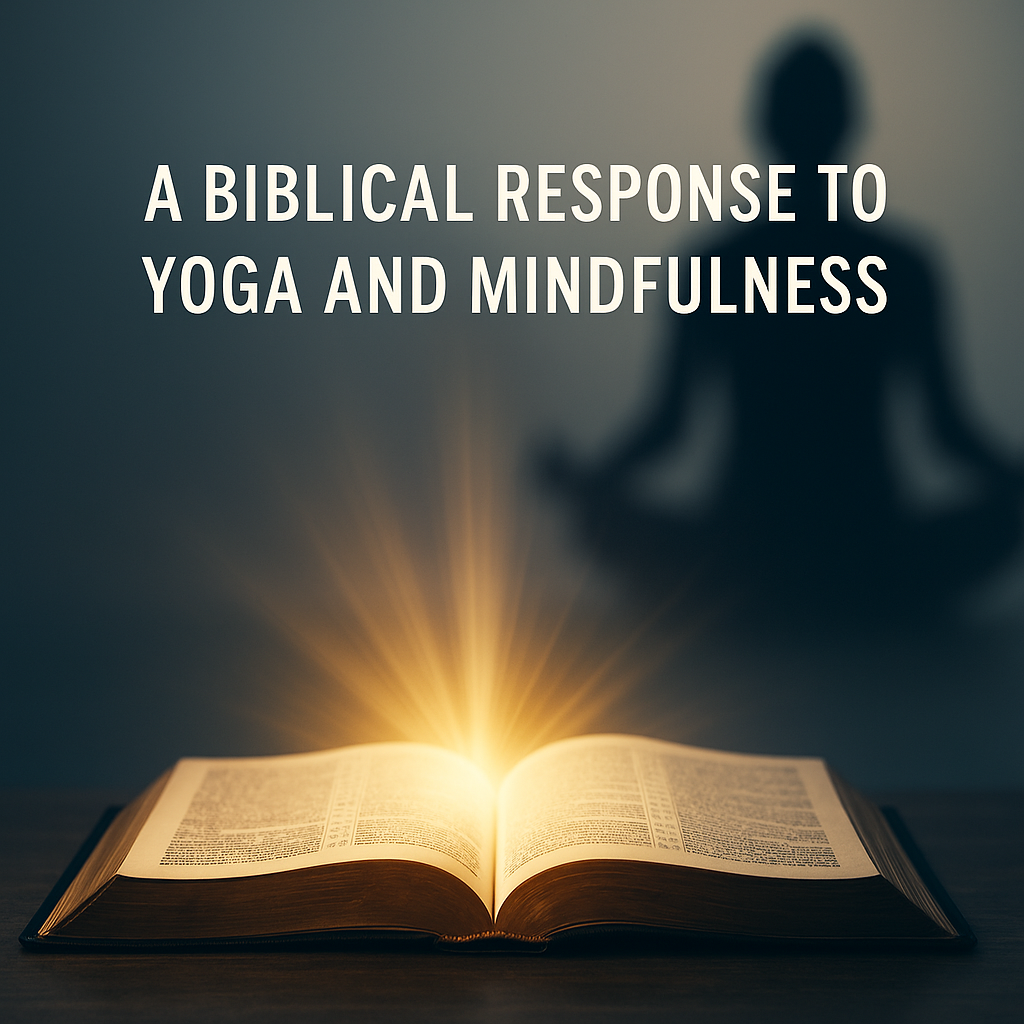⏱️ Estimated Reading Time: 5 min read
A Biblical Response to Yoga and Mindfulness
Evaluating Popular Practices Through a Biblical Lens
📅 Contending for the Word, August 3, 2025
✍️ Written by Dave Jenkins
Introduction
Yoga and mindfulness are everywhere today, from schools to workplaces, fitness apps, and even some churches. They are often presented as neutral tools for health and stress relief. This raises an important question, Can Christians practice yoga or mindfulness without compromising their faith?
To answer, we must look beyond surface benefits and examine their spiritual roots in light of God’s Word.
The Spiritual Roots of Yoga
Many people assume yoga is “just stretching,” but historically it is far more than exercise. Yoga originates in ancient Indian philosophy and is one of the six major orthodox schools of Hindu thought. The term itself comes from the Sanskrit root yuj, meaning “to yoke” or “to unite.” In Hindu philosophy, this union signifies joining the individual self with the universal divine.
Historical and Philosophical Roots
- Vedic origins: The earliest mentions of yogic practices are found in the Vedas, the foundational scriptures of Hindu tradition.
- Classical Yoga: The Yoga Sutras of Patanjali, compiled between 200 BCE and 500 CE, codified the tradition and outlined the eightfold path, Ashtanga Yoga, as a way to discipline the mind and pursue liberation.
- Influence from other traditions: Over time, yoga also influenced and was adopted into other Indian traditions, including Buddhism and Jainism.
- Multiple paths to liberation: The Bhagavad Gita describes different yogas, including Karma Yoga, the path of action, and Bhakti Yoga, the path of devotion, as ways to unite with the eternal.
Even when yoga is stripped of overtly religious language today, these roots remain. At its core, yoga is designed to pursue a spiritual goal that conflicts with Christianity.
“You shall have no other gods before me.”
Christians are called to worship the one true God, not engage in practices designed to unite with false gods. What begins as exercise often carries spiritual assumptions that contradict the gospel.
Mindfulness, A Neutral Practice?
Like yoga, mindfulness is often presented as secular and harmless, simply training yourself to focus on the present. Mindfulness is not spiritually neutral. Its roots lie in Buddhist meditation, which grows out of the Buddha’s teaching on suffering and liberation.
Historical and Philosophical Roots
- The Four Noble Truths: Buddhism teaches that life is marked by suffering, that suffering is caused by desire, and that liberation comes by extinguishing desire.
- The Eightfold Path: Mindfulness, sati in Pali, smṛti in Sanskrit, is one of eight steps on the Buddhist path to enlightenment, intended to cultivate awareness and detachment from worldly attachments.
- Meditative practice: The aim of mindfulness meditation is to observe thoughts and sensations without judgment, leading to detachment from desire and escape from the cycle of rebirth.
- Influence in the West: In the 20th century, Buddhist teachers popularized mindfulness in the West. Psychology and wellness movements secularized it further, reframing it as stress management while leaving behind overt religious context.
Scripture encourages Christians to examine their thoughts and take them captive to obey Christ, 2 Corinthians 10:5, yet biblical meditation is fundamentally different. It does not empty the mind, it fills the mind with the truth of God’s Word.
“I will meditate on Your precepts and fix my eyes on Your ways.”
Mindfulness encourages turning inward in search of peace. Biblical meditation turns upward, toward the Lord who alone grants true rest.
Biblical Discernment, Testing the Spirits
So, can Christians practice yoga or mindfulness? Scripture teaches us to test everything, hold fast what is good, and abstain from every form of evil, 1 Thessalonians 5:21–22.
Consider these questions:
- Does this practice glorify God, or self?
- Does it sharpen devotion to Christ, or blur spiritual boundaries?
- Does it honor Christ as Lord, or substitute man-made paths to peace?
Helpfulness is not the same as holiness. Christians are not called to blend biblical faith with worldly philosophies, we are called to live set apart for Christ.
A Better Way, True Peace in Christ
The gospel offers a better way than the temporary relief yoga or mindfulness promises. Jesus Himself invites us,
“Come to Me, all who labor and are heavy laden, and I will give you rest.”
In Him, we have the peace of Christ that surpasses understanding, Philippians 4:7, the Holy Spirit as our Comforter, John 14:26, and God’s Word to renew our minds, Romans 12:2.
We do not need yoga to stretch into peace. We do not need mindfulness to manage stress. We have Christ, who is Himself our peace.
Conclusion, Be Set Apart
The question, Can Christians practice yoga or mindfulness, must be answered with biblical clarity. While stretching or breathing exercises are not sinful in themselves, when they are tied to systems hostile to Christ, Christians must reject them.
- Do not compromise truth for cultural trends.
- Do not borrow spirituality from religions opposed to the gospel.
- Do rest in the finished work of Christ, who alone brings lasting peace.
Christians are called to be in the world, but not of it, John 17:14–16. Even in seemingly small matters of exercise or focus, we honor God by choosing practices rooted in His truth, not the world’s counterfeits.
Check out Contending for the Word Q&A and our Contending for the Word – YouTube.



